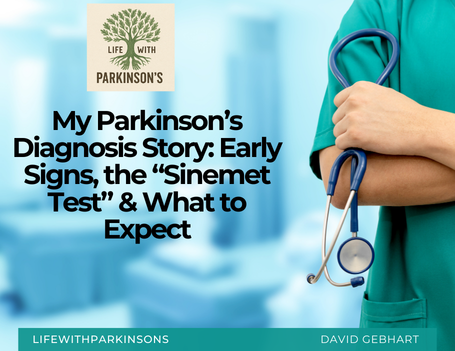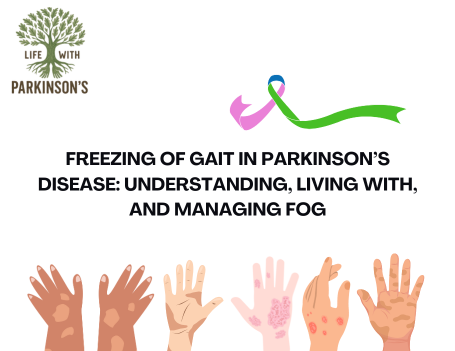Hi, it’s David from Life with Parkinson’s. If you’re new here—welcome. And to everyone returning, thank you for your continued love and support.
When I look back at all the changes I’ve gone through since diagnosis day eight years ago, there’s really only one thing I can say: Wow… what the heck happened?
Today, I want to talk about three life changes I had to accept just to keep my sanity and my mentality together while living with this chronic illness.
And before I go any further, please remember—I’m not a doctor. I’m just another person with Parkinson’s trying to pass on my experience and opinions in the hope that they help someone else out there.
Comparison is the Death of Joy
Mark Twain once said, “Comparison is the death of joy.”
Someone left that quote in a comment recently, and it hit me hard—because it couldn’t describe my experience any better.
Every year, when my diagnosis anniversary rolls around, I find myself reflecting on how far I’ve come… and sometimes, that reflection gets painful. I look back and feel a little lost, a little disappointed. My symptoms have progressed a bit more. My resilience feels a bit weaker. And suddenly I’m in this “poor me” mindset—thinking about everything I’ve lost.
That’s usually when Hayley steps in to pull me together so I can keep moving forward.
The truth is, looking back is self-destructive. Mark Twain nailed it. If I compare myself to who
I used to be, I’ll always pick the old me—pre-diagnosis Dave. Because that version could work overtime, earn more money, get up and walk whenever he wanted, even hold his bladder without thinking twice. Who wouldn’t want that version back?
But here’s the problem: no one else is walking backward. Everyone’s moving forward, and I’ve got to go that way too.
It’s not easy. Some days, I still find myself glancing over my shoulder—well, not too far; I can’t really turn my head that far anymore—but I remind myself that living in the past only drains me.
So, when I ask who I am now, the answer is simple: I’m a person with Parkinson’s, fighting as hard and as deep as I can, every day, to appreciate the moments I have.
Learning to Live with Less
The first life expectation I had to change was around money.
When I was diagnosed at 43, I was the main income earner for our family. Hayley stayed home with the kids, and that was always something I was proud of. I could work overtime, provide for us, and we were managing just fine.
But when you suddenly hear the words “You have Parkinson’s”, it’s like someone saying, “Okay, start preparing for retirement—right now.” I remember thinking, Are you kidding me? I’m only 43!
Yet, that’s what happened. We did the best we could, and I’m proud of that. But I won’t lie—our disposable income went down. With inflation rising, the costs kept climbing, and the money kept shrinking. When you’re living on a fixed disability pension, there’s not a lot of flexibility.
You keep cutting back… and then cutting back some more… until you start wondering what’s even left to cut.
If you’ve figured that out, let me know in the comments. We could use the advice.
But financial loss wasn’t the only thing I had to learn to live with.
After my diagnosis, Hayley started noticing changes before I did. She’d tell me I’d come home from work, eat dinner, and go straight to bed. And not the good kind of nap—the kind where you sleep for a couple of hours and wake up just as exhausted as before.
That was the start of my chronic fatigue sneaking in—fatigue, depression, and apathy. The three big enemies.
The Energy Problem (ATP and the Fight Against Fatigue)
I’ve spent a lot of time trying to understand what was happening to my energy levels, and in my opinion, it all boils down to something called adenosine triphosphate—ATP.
If you’ve been following me for a while, you’ve probably heard me talk about it before. I believe ATP is one of the most important things we can learn about with Parkinson’s.
I used to go for a one-kilometer loop walk around my complex. At first, I’d start strong. Then halfway through, I’d get tired. By the three-quarter mark, I was dragging myself. By the time
I stumbled through the front door, I was done—utterly exhausted.
Eventually, I learned that the problem wasn’t just Parkinson’s—it was that my body wasn’t efficiently producing and delivering ATP to recharge my cells.
Once I started working on that, things began to change.
Now, I can walk up to 4 kilometers in the morning and sometimes another 4 in the afternoon. It didn’t happen overnight—it took persistence and consistency—but it happened.
If you want to learn more about ATP and how it can help, I’ve linked my dedicated video about it on my website’s walking blog.
The Curse of Free Time
Now, here’s the big one.
When you retire early because of Parkinson’s, you suddenly have a lot of free time. And if you’re not careful, that time can become your worst enemy.
For me, it started with addictive behaviors. I got hooked on a cellphone game a few months ago. It was embarrassing—I couldn’t stop playing. And it happened fast.
If you think addiction can’t happen to people with Parkinson’s, trust me—it can. If you or someone you care for is struggling with addictive behavior, reach out. Caregivers, this goes for you too—check in, ask questions, and step in early. Thankfully, Hayley helped me break that cycle, and I’ll always be grateful for that.
The second battle that comes with too much free time is apathy.
I’ve used a daytimer for years to organize my days. But sometimes, I make a list, look at it, and feel overwhelmed before I even start. The tasks are small, maybe 10 or 15 minutes each, but in that moment, they feel huge. And even when I get through them, the next day, the list feels just as heavy again.
That’s the tricky thing about apathy—it sneaks in quietly and makes everything seem harder than it is.
And then there’s depression. Thankfully, it’s not something I’m battling right now, but when it comes, it’s usually because I’ve been sitting too long, thinking too much about the past. Like Mark Twain said, “Comparison is the death of joy.”
So I’ve learned that the key to managing free time is staying mindful—keeping my thoughts and my focus in the present.
Fighting Back
There are tools to fight back against all of this.
For me, it starts with diet. When I eat well, I feel well. A healthy diet lifts my mood, stabilizes my energy, and gives me purpose.
The second is exercise—and I can’t stress this enough. Exercise affects all of our symptoms in a positive way. Medication doesn’t cover everything, but exercise? It touches every part of our body. It helps our movement, our mindset, and our motivation.
So, if there’s one message I want to leave you with, it’s this: keep moving. Even if it’s slow, even if it’s small—it matters.
Thank you for continuing to take this journey with me. Thank you for watching, reading, sharing, and being part of this community.
I’ll see you in the next one.
Have a good day—and goodbye.
☕ Support My Journey
If you’d like to support my work, you can do so Here. Every contribution helps me keep creating, learning, and sharing my experience with others facing Parkinson’s.
A Note from Me
Living with Parkinson’s isn’t easy—but learning to adapt, laugh, and find meaning in each day makes the journey lighter. If you’re struggling today, know that you’re not alone.
👩❤👨 Caregiver’s Corner
If you’re a caregiver, please remember your support makes a world of difference. Sometimes all it takes is a gentle nudge—like Hayley reminding me to get up, eat right, or take a walk—to keep us on track.
Medical Disclaimer
I’m not a doctor. This blog reflects my personal experience with Parkinson’s disease and should not be taken as medical advice. Always consult your healthcare provider before making changes to your treatment or exercise plan.




